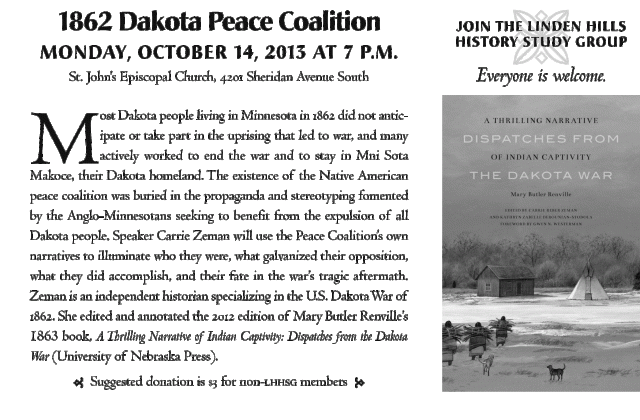March 17, 2013 2:00 PM Pond Dakota Heritage Society, Bloomington, MN. “Stories of the 1862 Dakota Peace Coalition.” Most Dakota people living in Minnesota in 1862 did not anticipate or participate in the U.S.-Dakota War. This fact was long buried under misinformation, spread by early writings which sought to justify the seizure of Dakota lands in the wake of the war. These documents effectively silenced the story of the majority of Dakota people, and of the Dakota resistance movement known historically as the Peace Coalition. Historian Carrie Reber Zeman recovers the diverse voices of this anti-war coalition, using their own narratives to illuminate who they were, what galvanized their opposition, what they accomplished and what happened to them in the wars terrible aftermath. She argues that the Dakota men and women who effectively worked to end the war were motivated by their desire to stay in Mni Sota Makoce, the Dakota homeland. Carrie Reber Zeman is an independent historian specializing in the context and historiography of the U.S. Dakota War of 1862. Zeman edited and annotated the 2012 edition of Mary Butler Renville’s 1863 book, A Thrilling Narrative of Indian Captivity: Dispatches from the Dakota War (University of Nebraska Press).Open to the public.
January 29, 2013 7:00 PM at the Minnesota History Center, St. Paul, MN The 1862 Dakota Peace Coalition Most Dakota people living in Minnesota did not anticipate or participate in the U.S. Dakota War of 1862. Yet the received story, based on early sources which sought to justify the seizure of Dakota lands in the wake of the war, is almost silent about the Dakota majority who did nothing to deserve exile or extermination. Some of these Dakota went even further in 1862, working from the inside to thwart the war effort. Their story, too, has been marginalized: by attribution to a handful of token Dakota Christians. Historian Carrie Reber Zeman recovers the diverse voices of the Dakota resistance movement historically known as the Peace Party, using their own narratives to illuminate who they were, what galvanized their opposition, what they accomplished, and what happened to them after the war. She argues that the Dakota men and women who actively worked to end the war were motivated by their desire to stay in Mni Sota Makoce, the Dakota homeland. Sponsored by the Minnesota Historical Society. Open to the public.
September 25-27, 2012 Northern Great Plains History Conference. Carrie Reber Zeman, speaker:“’She Persevered Until the Indian Yielded:’ Perceptions of the 1859 Interracial Marriage of Mary Adeline Butler and John Baptiste Renville on the Minnesota Frontier” Fargo, ND.
August 24, 2012 Friday Dakota War Symposium. Zabelle Stodola, speaker. “Mary Schwandt and Maggie Brass (Snana): A Minnesota Pocahontas Story?” Turner Hall, New Ulm, Minnesota. Open to the public.
August 22, 2012 Tuesday Carrie Reber Zeman. “Why ‘Our Children Are Dying With Hunger’ in 1862” Redwood Falls Public Library, Redwood Falls, MN. Open to the public.
July 24, 2012 Thursday Carrie Reber Zeman, speaker “‘Our Children Are Dying With Hunger:’ Malnutrition, Morbidity and Mortality on the Sioux Reservation in 1862.” 7:00 PM Turner Hall, New Ulm, Minnesota. Sponsored by the New Ulm Public Library. Open to the public.
July 8, 2012 Mission Sunday at the historic chapel at Lac Qui Parle, John B. Renville’s childhood home. 10:30 AM: worship service in Dakota and English lead by the Ascension Church choir, descendants of John’s congregation at Ascension on the Sisseton and Wahpeton Reservation. 12:00 Noon: pot luck picnic lunch. 1:00 PM: Carrie Reber Zeman, speaker, “The Prince of Indian Preachers: The Life of John B. Renville.” Sponsored by the Chippewa County Historical Society. Open to the public.
June 24, 2012 Release party for A Thrilling Narrative with the editors and honored guests Gwen Westerman, Glenn Wasicuna, and Alan Woolworth at the historic Gideon Pond House, Bloomington, Minnesota, 2:00PM. Open to the public.


